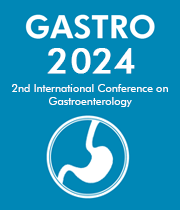Aleksandra Leszczynska, University of California San Diego, United States
Metabolic Dysfunction-Associated Steatohepatitis (MASH), a subset of Metabolic Dysfunction-Associated Steatotic Liver Disease (MASLD), has emerged as a significant public health concern worldwide. MASH is characterized by hepatic inflammation, which can lead to fibrosis, cirrhosi [....] » Read More































Title : Validation of GLAS (GP73+LG2m+Age+Sex) and ASAP (Age+Sex+AFP+PIVKA-II) algorithms for the management of liver fibrosis, cirrhosis and cancer
Philip M Hemken, Abbott Diagnostics Division R&D, United States
Diagnosis of liver disease at earlier stages can improve outcomes and reduce the risk of progression to malignancy. Liver biopsy is the gold standard for diagnosis of liver disease, but it is invasive and sample acquisition errors are common. Serum biomarkers for liver function a [....] » Read More
Title : Digesting the connection: Exploring the psychological impact of gastroenterology issues on mental and emotional well being
Tracy E Hill, MGS Products LLC, United States
This presentation delves into the intricate relationship between gastroenterology issues and their profound impact on an individual's mental and emotional health. Gastrointestinal disorders, ranging from common ailments to chronic conditions, often extend beyond the physical [....] » Read More
Title : Steatosis, even In type 1 diabetes mellitus?
Ganavi.Y.P, Ramaiah Medical College, India
Metabolic Associated Fatty Liver Disease(MASLD) comprises hepatic steatosis without injury to steatosis, inflammation, hepatocyte injury with or without fibrosis. Nearly one fourth of the people with Type 1 Diabetes Mellitus (T1 DM) are estimated to be having MASLD (27.7%). [....] » Read More
Title : Gastrointestinal, nutritional, endocrine, and microbiota conditions in autism spectrum disorder
Loyacono Nicolas, Hospital de Clinicas Jose de San Martin, Argentina
Gastrointestinal, nutritional, metabolic, endocrine, and microbiota medical problems in pediatric patients diagnosed with autism spectrum disorder (ASD) are some of the coexisting medical conditions in ASD diagnosis. Their prevalence reaches more than 91 % for gastrointestinal pr [....] » Read More
Title : Menetrier's disease presenting as gastric outlet obstruction mimicking linitis plastica: A case report
Erika Johanna P Tanada, University of Santo Tomas Hospital, Philippines
Menetrier’s disease is a rare, acquired premalignant disorder of the stomach with thickened gastric folds associated with protein-losing enteropathy and H Pylori infection. The clinical presentation of Menetrier’s disease might cause diagnostic difficulty and can be m [....] » Read More
Title : The chameleon effect: A case of isolated pancreatic tuberculosis mimicking pancreatic cancer in young adult male with jaundice and hyperglycemia
Kristiann Lae Dano, Davao Regional Medical Center, Philippines
Introduction: Pancreatic Tuberculosis is considered a rare extrapulmonary source of Tuberculosis even on highly prevalent countries. The diagnosis can be challenging since the signs and symptoms can mimic pancreatic cancer. With the patient’s consent, this case report will [....] » Read More
Title : Comparison of minocycline and ornidazole-containing bismuth quadruple therapy and classical quadruple therapy as first-line for helicobacter pylori eradication: A prospective, multicenter, randomized clinical trial
Xueping Huang, Fujian Provincial Hospital, China
Background: The clinical application of bismuth quadruple therapy is often challenging due to the frequent adverse reactions and complicated administration of tetracycline and metronidazole. The aim of this study was to assess the efficacy, compliance, and safety of minocycline, [....] » Read More
Title : The mechanism of associating liver partition and portal vein ligation: A systematic review
Junwei Zhang, Peking Union Medical College Hospital, China
Background: Associating liver partition and portal vein ligation for staged hepatectomy (ALPPS) was widely used in clinic. The mechanism of ALPPS need to be fully illustrated. Methods: The present systematic review aimed to examine existing data on the mechanism of ALPPS. Elec [....] » Read More
Title : Construction and validation of an unsupervised machine learning model based on RNA alternative splicing for the prognosis of non-metastatic gastric cancer
Zheng Jiang, Chinese Academy of Medical Sciences and Peking Union Medical College, China
Background: Alternative splicing (AS) is an important transcriptional regulatory mechanism, leading to polymorphisms in transcript and protein structure and function. This study aimed to establish more accurate prediction models for nonmetastatic gastric cancer by AS. Methods: [....] » Read More
Title : Preliminary result from a prospective single-center randomized controlled study of No.6 lymph node dissection in improving the positive rate of lymph nodes in laparoscopic hepatic flexure of colon cancer
Liu Qizhi, Shanghai Fourth People’s Hospital, School of Medicine, Tongji University, China
D3 lymphadenectomy and Complete Mesocolic Excision (CME) are standard treatment for right colon cancer. Colon cancer of hepatic flexure is likely to have metastasis of the infrapyloric lymph nodes (No. 206), which are not regional Lymph Nodes (LN). LN dissection of No.206 group b [....] » Read More
Title : Liver Regeneration (LR): The treatment of liver failure and beyond
Jinhua Hu, Fifth Medical Center of Chinese PLA General Hospital, China
Liver regeneration is an ancient and realistic topic. The mechanism of liver regeneration is well described in the PHx model, and it is generally believed that multiple signaling pathways, including Wnt/β-Catenin signaling, Notch signaling, mTOR signaling, etc. are important [....] » Read More
Title : Primary lleal Volvulus- a rare twist in an elderly patient: Case report
Srikant Agrawal, National Academy of Medical Sciences, Nepal
Background: Small bowel volvulus is a rare entity and it is even rarer for the ileum to undergo torsion without any known predisposing factors. It presents as acute abdomen with features of intestinal obstruction. As it is a life-threatening condition, it should be kept as a diff [....] » Read More
Title : Gastric epithelial attachment of helicobacter pylori induces EphA2 and NMHC-IIA receptors for epstein-barr virus
Sintayehu Fekadu, Hawassa University, Ethiopia
Epstein-Barr virus (EBV)-associated gastric cancer belongs to 1 of the 4 subtypes of gastric cancer and accounts for 10% of the total gastric cancers. However, most cases of gastric cancer have a history of Helicobacter pylori (H. pylori) infection. Therefore, we investigated t [....] » Read More
Title : Spectrum of clinical presentation in patients with chronic liver disease secondary to non-alcoholic fatty liver disease
Kanwal Butani, Jinnah Postgraduate Medical Center, Pakistan
Introduction: Non-Alcoholic Fatty Liver Disease (NAFLD) is the most common Chronic Liver Disease (CLD). NAFLD is recognized as an important public health problem nowadays and it encompasses a variety of liver pathologies including simple steatosis, Nonalcoholic Steatohepati [....] » Read More
Title : Open versus laparoscopic colectomy in management of severe ischemic colitis using a propensity score matched in comparison
Mohamed Eraki, Zagazig University, Egypt
Ischemic colitis is rarely treated by laparoscopy. The point of this review using of propensity score matched study to compare preoperative with intraoperative character and short-term outcome for severe and urgent cases of ischemic colitis. Methods techniques:& [....] » Read More
Title : Safety and challenges of endoscopic retrograde cholangiopancreatography among elderly patients (Interim analysis)
Nosherwan Shahwani, Liaquat National Hospital, Pakistan
Introduction: The pancreaticobiliary diseases are common in the elderly. The prevalence of choledocholithiasis (bile duct stones) increases with age about four times compared with the younger population Endoscopic retrograde cholangiopancreatography (ERCP) is a routinely used dia [....] » Read More
Title : The inhibitor of interleukin-3 protects against neutrophil infiltration in severe acute pancreatitis
Mohammed Merza, Hawler Medical University, Iraq
Background and purpose: Severe acute pancreatitis (AP) is linked with leukocyte infiltration and tissue necrosis, but the cellular signaling pathways driving organ destruction in the pancreas remain unknown. IL-3 is a powerful regulator of different cellular processes that p [....] » Read More
Title : The role of ABL kinases in alcohol-associated liver disease
Wei Qiu, Loyola University Chicago, United States
Alcohol-asscociated liver disease (ALD) represents a spectrum of alcohol use-related diseases, ranging from steatosis to cirrhosis, and is one of the primary causes of chronic liver disease worldwide. Outside of alcohol abstinence, there are currently no FDA-approved treatm [....] » Read More
Title : Unveiling gender disparities in acute pancreatitis: A comprehensive analysis of mortality rates among hospitalized patients with infected necrosis.
Hezborn Magacha, East Tennessee State University, United States
Background: Infected necrosis in acute pancreatitis is associated with significant morbidity and mortality. The development of infection within necrotic pancreatic tissue can lead to a cascade of complications, and managing these complications is crucial for improving outcomes. W [....] » Read More
Title : A rare case of pembrolizumab-induced severe gastritis
Celyn Idami, Penn Medicine, United States
First approved in the United States in 2011, immune checkpoint inhibitors (ICIs) represent a significant advancement in treating various malignancies. The mechanism of action is to prevent inhibition of the host's T cells, thereby allowing them to attack and destroy malignant [....] » Read More
Title : Obstructive jaundice in the setting of Ampulla of Vater tumor
Bipneet Singh, Henry Ford Jackson, United States
Ampullary cancer forms in the ampulla of vater, an opening for CBD and pancreatic duct that enters theduodenum. This type of cancer is fairly rare accounting for less than 1% of all cancers affecting the gastrointestinal tract. 84 y.o. female presented with epigas [....] » Read More
Title : New-onset ulcerative colitis in the tenth decade of life
Priya Kumari Maheshwari, University of Central Florida/HCA Florida West Hospital, United States
Introduction: Ulcerative Colitis (UC) exhibits a bimodal age distribution, affecting 10–30% of the population beyond the age of 60. Recognition of elderly-onset UC remains challenging. Over the past two decades, only 10% of patients aged over 80 have received a diagnosis, a [....] » Read More
Title : Missed case of wilson's disease
Bipneet Singh, Henry Ford Jackson, United States
34 year old female with history of alcohol use presented with bilateral lower limb weakness and had macrocytic anemia and elevated LFTs. She had undergone sleeve gastrectomy 2 years ago and with high suspicion of nutritional deficiency she was checked for B12 which turned out to [....] » Read More
Title : A case of gastric adenocarcinoma in the remnant stomach after Roux-En-Y gastric bypass
William Song, Ochsner Clinic Foundation, United States
Gastric cancer is the 5th most common type of malignancy world-wide. Obesity has been associated with an increased risk of gastric cancer and Roux-en-Y is the most commonly performed surgical weight-loss procedure in the US. Gastric adenocarcinoma in the remnant stomach after Rou [....] » Read More
Title : Rectal malignant melanoma: A second primary malignancy in a filipino adult male- A case report
Katrina Nicole R. Mejia, Cardinal Santos Medical Center, Philippines
Malignant melanoma is most commonly found on the skin and rarely occurs in the the rectal region. We report a case of a 77-year-old Filipino adult presenting with rectal bleeding for three weeks. He underwent sigmoidoscopy that showed thrombosed hemorrhoids; however, subsequent s [....] » Read More
Title : Pancreatic lipomatosis in two siblings presenting with steatorrhea: A case report
Michelle Dawn Ramos, Chong Hua Hospital, Philippines
Pancreatic lipomatosis is a rare disease with an unknown etiology characterized by the replacement of pancreatic acinar cells with adipose tissue associated with preservation of pancreatic duct and islet cell histology. In this paper, we report the case of two 40- and 46-year- [....] » Read More
Title : A novel gastroprotective effect of zeaxanthin against stress induced gastritis in male rats targeting the expression of HIF-1?, TFF-1 and MMP-9 through PI3K/Akt/JNK signaling pathway
Eman Mohamad EL Nashar, King Khalid University, Saudi Arabia
Stress-induced gastritis is a common problem in the intensive care unit. Zeaxanthin (ZE), a non-provitamin A carotenoid has been known to exert antioxidant and anti-inflammatory effects. In this study, we examined the effect of ZE on water avoidance stress (WAS)-induced gastritis [....] » Read More
Title : Autophagy promotes the survival of adipose mesenchymal stem/stromal cells and enhances their therapeutic effects in cisplatin-induced liver injury via modulating TGF-?1/Smad and PI3K/AKT signaling pathways
Eman Mohamad EL Nashar, King Khalid University, Saudi Arabia
Autophagy is a key metabolic process where cells can recycle its proteins and organelles to regenerate its own cellular building blocks. Chemotherapy is indispensable for cancer treatment but associated with various side-effects, including organ damage. Stem cell-based therapy is [....] » Read More